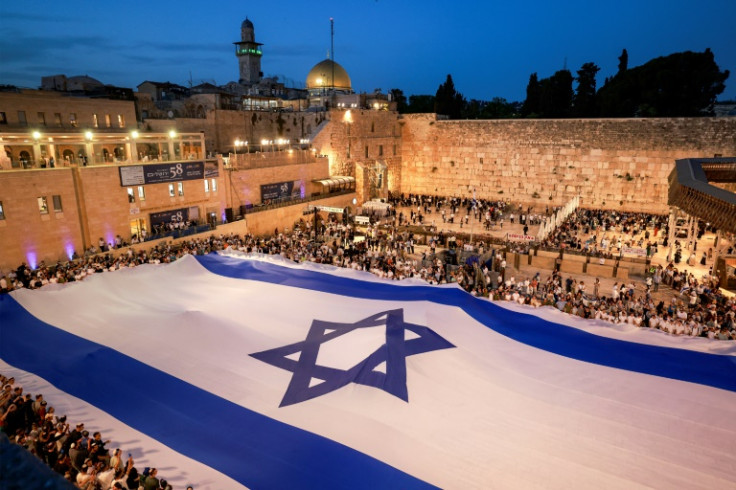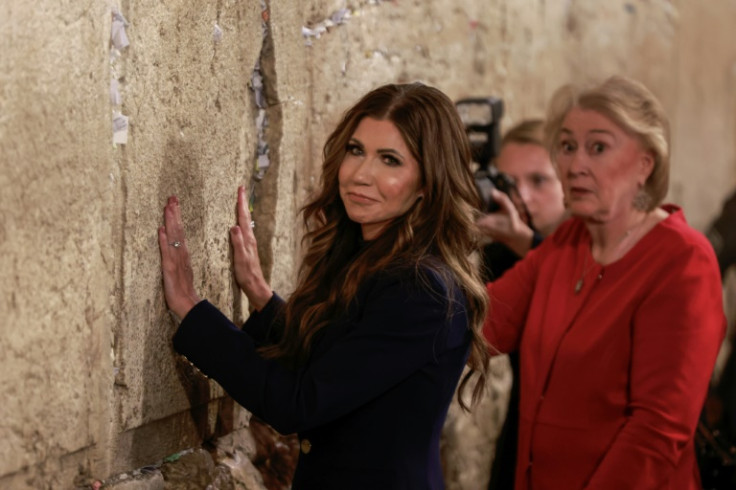Israel Marks Second Jerusalem Day Under Shadow Of Gaza War

Israeli police deployed near the walls of Jerusalem's Old City on Monday ahead of annual celebrations marking Israel's capture of east Jerusalem, held this year under the shadow of the war in Gaza.
Jerusalem Day commemorates what Israel considers the reunification of the city under its control following the Arab-Israeli war.
Every year, thousands of Israeli nationalists, many of them religious Jews, march through Jerusalem and its annexed Old City, including in predominantly Palestinian neighbourhoods, waving Israeli flags, dancing and sometimes shouting inflammatory slogans.
The route ends at the Western Wall -- the last remnant of the Second Temple destroyed by the Romans in 70 AD -- the holiest site where Jews are allowed to pray.
"After so many years that the people of Israel were not here in Jerusalem and in the land of Israel, we arrived here and conquered Jerusalem, the Temple Mount and the Western Wall," said 21-year-old Yeshiva student Yosef Azoulai.
"So we celebrate this day in which we won over all our enemies, and we're here now thanking God for this great miracle."
Events began Sunday evening, as is customary with Jewish holidays, with crowds unfurling a giant Israeli flag in the plaza facing the Western Wall.
On Monday morning, far-right Israeli National Security Minister Itamar Ben-Gvir visited the Al-Aqsa Mosque compound, which Palestinians see as a provocation.
The site is Islam's third-holiest and a symbol of Palestinian national identity. Known to Jews as the Temple Mount, it is also Judaism's holiest place, though Jews are forbidden from praying there.
In a video from the site, Ben Gvir said he had "ascended to the Temple Mount for Jerusalem Day, and prayed for victory in the war" in Gaza, triggered by Hamas's October 7 attack.
It is the second Jerusalem Day since the war began, amid renewed calls by some Israeli right-wing figures to annex Palestinian territory.
In 2021, Hamas launched rockets towards Jerusalem as marchers approached the Old City, sparking a 12-day war and outbreaks of violence in Israel between Jews and Arabs.
On Monday, the Israeli army said three projectiles were launched from Gaza, two falling inside the territory and one intercepted.
Skirmishes are common during the event, especially in the streets of the Old City, where some marchers have been known to chant racist slogans.
Last year, two journalists -- including a Palestinian photographer -- were assaulted by teenage marchers.
Many Palestinians, who claim east Jerusalem as the capital of their future state, view the march as a provocation. Authorities sometimes order Palestinian shops in the Old City to shut.
This year, shopkeepers told AFP police had warned them not to speak to journalists.
In a counter-event, peace activists staged a "march of flowers" to challenge what they see as the flag march's divisive message.
"We will give flowers of peace to residents of Jerusalem, especially, Muslims, Christians," said organiser Gadi Gvaryahu of Tag Meir, an umbrella group promoting coexistence.
Orly Likhovski of the Israel Religious Action Center said those taking part were "not willing to accept that this day is marked by violence and racism", adding they hoped to represent "a Jewish voice for a different kind of Jerusalem".
Some Palestinians accepted the flowers.
One elderly man near Damascus Gate politely refused, saying: "Do you see what is happening in Gaza? I'm sorry, but I cannot accept."
Later, teenage marchers were seen tearing up flowers and tossing them into the air.
Police said Sunday they were deploying "thousands" of officers to ensure security.
In a rare move, the Israeli cabinet was set to meet nearby in the Palestinian neighbourhood of Silwan, home to an archaeological site known as the City of David -- believed to mark the location of ancient Jerusalem during biblical times.
Since June 1967, Israeli settlement in the eastern part of the city -- considered illegal under international law -- has expanded, drawing regular international criticism.
Israel considers Jerusalem its indivisible capital, though the international community does not recognise this.
During his first term, however, President Donald Trump moved the US embassy to Jerusalem after declaring the city Israel's capital.
On Sunday evening, his ambassador to the country, Mike Huckabee, and visiting US Secretary of Homeland Security Kristi Noem briefly attended the commemorations at the Western Wall.

© Copyright AFP 2026. All rights reserved.





















